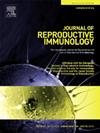Comprehensive analysis of alterations in spermatogenic stages after immunization with lactate dehydrogenase-C in male albino rats
IF 2.9
3区 医学
Q3 IMMUNOLOGY
引用次数: 0
Abstract
The ever-rising global population emphasizes on requirement for the development of new contraceptive techniques that fits the needs and preferences of people during their reproductive phases of life. Immunocontraception is the process of inducing a humoral immune response by using a reproductive protein that renders a sperm infertile for a predetermined amount of time. One of the reproductive proteins found on the sperm membrane that is known to have immunogenic qualities is lactate dehydrogenase-C (LDH-C). The present study was planned to assess the effect of LDH-C as an immunocontraceptive agent in male albino rats. Sperm membrane extract (SME) was prepared using deoxycholate detergent. Proteins from the SME were separated on reducing SDS-PAGE, further fractioned by gel filtration chromatography on sephadex G-25 to isolate LDH-C proteins. Rats were immunized with purified LDH-C for a period of 28 days at weekly intervals. ELISA confirmed the presence of antibodies as a high antibody titre of 6400 was observed on 35 DPI that remained consistent till 77 DPI, and then declined afterwards. Fertility rate decreased by 85.70 % in immunized male rats. It can be concluded from the study that LDH-C antigens are capable of eliciting reversible immune response, significantly affecting the sperm motility amongst various sperm parameters and histological results have revealed that the effect of immunization was at testicular level as the total number of spermatogenic cells decreased in immunized rats making it a potential candidate for immunocontraceptive vaccines.
乳酸脱氢酶c免疫后雄性白化大鼠生精期变化的综合分析
全球人口的不断增长强调需要发展新的避孕技术,以适应人们在生育阶段的需要和偏好。免疫避孕是通过使用一种生殖蛋白来诱导体液免疫反应,使精子在预定的时间内不育的过程。在精子膜上发现的一种已知具有免疫原性的生殖蛋白是乳酸脱氢酶c (LDH-C)。本研究拟评估ldl - c作为免疫避孕药对雄性白化大鼠的作用。采用脱氧胆酸洗洁剂制备了精子膜提取物(SME)。在还原SDS-PAGE上对SME中的蛋白质进行分离,并在sephadex G-25上进行凝胶过滤层析,分离出LDH-C蛋白。用纯化的ldl - c免疫大鼠,每隔一周免疫28天。ELISA法证实了抗体的存在,35 DPI的抗体滴度为6400,一直保持到77 DPI,之后抗体滴度下降。免疫后的雄性大鼠生育率下降85.70 %。本研究表明,LDH-C抗原能够引起可逆的免疫应答,在多种精子参数中显著影响精子活力,组织学结果显示免疫作用在睾丸水平,免疫大鼠生精细胞总数减少,使其成为免疫避孕疫苗的潜在候选物。
本文章由计算机程序翻译,如有差异,请以英文原文为准。
求助全文
约1分钟内获得全文
求助全文
来源期刊
CiteScore
6.30
自引率
5.90%
发文量
162
审稿时长
10.6 weeks
期刊介绍:
Affiliated with the European Society of Reproductive Immunology and with the International Society for Immunology of Reproduction
The aim of the Journal of Reproductive Immunology is to provide the critical forum for the dissemination of results from high quality research in all aspects of experimental, animal and clinical reproductive immunobiology.
This encompasses normal and pathological processes of:
* Male and Female Reproductive Tracts
* Gametogenesis and Embryogenesis
* Implantation and Placental Development
* Gestation and Parturition
* Mammary Gland and Lactation.

 求助内容:
求助内容: 应助结果提醒方式:
应助结果提醒方式:


